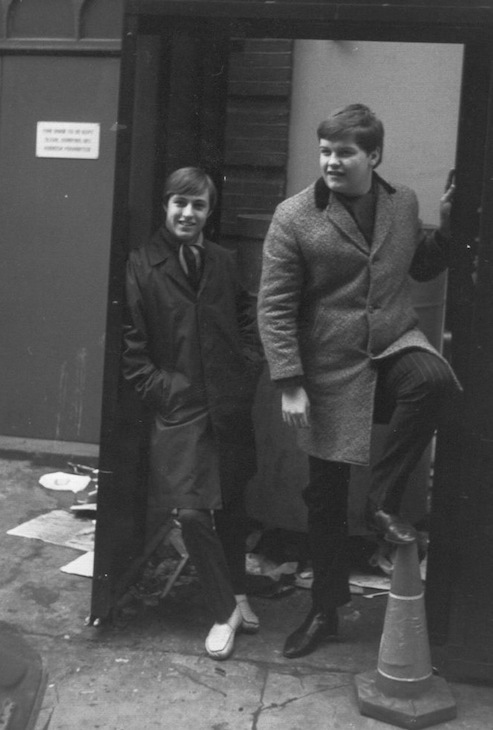
DJ and publisher Paul Hallam has owned many London pubs, clubs and bars including Filthy McNasty's where The Libertines started out.
But during the 80s he photographed the mod revivalist scene on his old Olympus Trip camera; those photographs have just been published as a collection entitled Odds and Sods.
Hallam spent his early teenage years daydreaming about owning a scooter and a suit. Then, after reading Richard Barnes's seminal 1979 book Mods!, he crashed the scene in Shepherd's Bush.
At 17, he began DJing at a night called Sneakers at the Bush Hotel. Named after Tommy Tucker's song Hi-Heel Sneakers it ran every Sunday night and played rare RnB and soul.

Being a mod wasn't about politics, it was about finding a record no-one had heard before and dressing snappily: "To turn mod in the early days, you had to have a button down shirt, a pair of Sta-Prest trousers and a pair of Hush Puppies," says Hallam.
"We’d meet in coffee shops to discuss what was going to be 'in' and what wasn't, and I'd announce it over the microphone in Sneakers."
The mod scene really took off in working class areas. The Ilford Palais (demolished for apartment blocks in 2007) did mod all-dayers and the Bush Hotel, an Irish pub (now an O'Neill's), were popular stomping grounds.
In one group picture taken on a Sunday morning in Soho 1985, Hallam points out Raymond Revue Bar to the right and Freydos Café to the left.
"That part of Soho doesn't exist anymore, it's gone."

In an interview published on the Modern Society blog Richard Barnes says this generation had "grown up in a society that had been through five or six years of warfare and was coming to terms with the damage and shock to the system.
"There was tremendous social upheaval and fundamental change to society and lifestyles. Barriers were coming down. Attitudes on homosexuality, divorce, sex and censorship were all changing. Advertising and early consumerism were taking hold."
Hallam remembers the 80s as 'a decade of disorder'. Often mod clubs would be attacked: "If you went around looking like I did, very often you’d be abused verbally or physically.
"Skinheads were actively looking out for mods, and putting windows through to fight us."

"When the whole mid-80s mod revival started to happen, it became all about getting your shoes and shirts handmade. We were looking back at the 62 mod, studying Richard Barnes's book, we weren't listening to The Who, we were sitting in bars in Shoreditch, reading French newspapers."
Hallam remembers forgoing food so he could put £1.50 every week towards a suit. "I'd come into London on a Saturday morning, maybe I'd go to a record shop in Fulham, or go clothes shopping in Shepherds Bush or Tooting," he says.
Fabric was bought in Textile Kings by the market in Berwick Street, then it'd be taken to a tailor, of which there was an abundance back then. The East London Mods went to Goldbergs, a Jewish tailor from the 60s, or places around Aldgate and Whitechapel.
We’re not listening to The Who, we're sitting in bars in Shoreditch, reading French newspapers.
Even so you risked turning up in the same fabric as your mates, as Hallam recalls, wincing.
"I used to get shirts made by a 90-year-old Armenian guy in Chiswick just so I never turned up at a club with the same shirt as anyone else. I remember I found this tailor in Upper Street, Islington, and it was the best fabric. I had a pair of trousers made — 28in waist — and I wore them to this club where the other DJ was wearing exactly the same fabric, so as soon as I got home I threw them away. That's how seriously we took it."

Hallam says if he had to sum it up, it was about attention to detail. "I found a tailor in Surbiton who had been making suits since the 50s for the jazz crowd, so we went from three-button to two-button suits 'cause that’s what they were wearing on the jazz scene," he says.
There was a couple of guys who would stand up all the way from Cardiff to Paddington because they didn't want to get creases in their trousers.

Flicking through Odds and Sods, you might recognise a young Eddie Piller — still DJing on Soho Radio — or Martin Blunt, bassist of The Charlatans. David Holmes, a young mod from Belfast (now international DJ and producer who worked on the Ocean's Eleven soundtrack) would also frequent the Bush.
But Hallam admits it was a bubble — by the time his Sneakers club started there were only about 500 Mods in the country.
His collection of black and white photographs capture the friendships forged as a youth culture came of age.
Paul Hallam is a publisher of pulp fiction with Old Dog Books and is editor of Street Sounds, a monthly newspaper which celebrates street culture around the world. Odds and Sods is available online.
Share your memories of growing up in 80s London in the comments section below.



